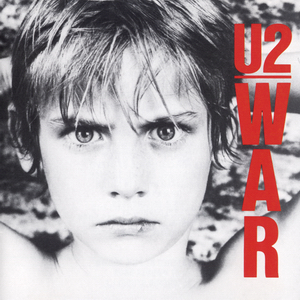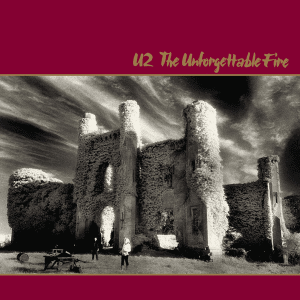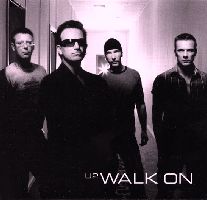Related Research Articles

U2 are an Irish rock band formed in Dublin in 1976. The group consists of Bono, the Edge, Adam Clayton, and Larry Mullen Jr.. Initially rooted in post-punk, U2's musical style has evolved throughout their career, yet has maintained an anthemic quality built on Bono's expressive vocals and the Edge's chiming, effects-based guitar sounds. Bono's lyrics, often embellished with spiritual imagery, focus on personal and sociopolitical themes. Popular for their live performances, the group have staged several elaborate tours over their career.

War is the third studio album by Irish rock band U2. It was produced by Steve Lillywhite, and was released on 28 February 1983 on Island Records. The album is regarded as U2's first overtly political album, in part because of songs like "Sunday Bloody Sunday" and "New Year's Day", as well as the title, which stems from the band's perception of the world at the time; lead vocalist Bono stated that "war seemed to be the motif for 1982."

The Unforgettable Fire is the fourth studio album by Irish rock band U2. It was produced by Brian Eno and Daniel Lanois, and released on 1 October 1984 by Island Records. The band wanted to pursue a new musical direction following the harder-hitting rock of their previous album, War (1983). As a result, they employed Eno and Lanois to produce and assist in their experimentation with a more ambient sound. The resulting change in direction was at the time the band's most dramatic. The album's title is a reference to "The Unforgettable Fire", an art exhibit about the atomic bombing of Hiroshima.

"Stuck in a Moment You Can't Get Out Of" is a song by Irish rock band U2. It is the second track on their tenth studio album, All That You Can't Leave Behind (2000), and was released as the album's second single on 29 January 2001. The band's lead vocalist Bono has said the song was inspired by a fictional conversation with his friend Michael Hutchence about suicide. The song peaked at number 52 on the US Billboard Hot 100 and topped the charts in Canada, their native Ireland and Italy, while reaching the top 10 in Australia, Denmark, Finland, the Netherlands, Norway, Spain and the United Kingdom. In 2002, the song won the Grammy Award for Best Pop Performance by a Duo or Group with Vocal at the 44th Annual Grammy Awards ceremony.

"Where the Streets Have No Name" is a song by Irish rock band U2. It is the opening track from their 1987 album The Joshua Tree and was released as the album's third single in August 1987. The song's hook is a repeating guitar arpeggio using a delay effect, played during the song's introduction and again at the end. Lead vocalist Bono wrote the lyrics in response to the notion that it is possible to identify a person's religion and income based on the street on which they lived, particularly in Belfast. During the band's difficulties recording the song, producer Brian Eno considered erasing the song's tapes to have them start from scratch.

"I Will Follow" is a song by rock band U2. It is the opening track from their debut album, Boy, and it was released as the album's second single in October 1980. Lead singer Bono wrote the lyrics to "I Will Follow" in tribute to his mother, who died when he was 14 years old.

"Sometimes You Can't Make It on Your Own" is a song by Irish rock band U2. It is the third track on their eleventh studio album, How to Dismantle an Atomic Bomb (2004), and was released as the album's second single worldwide except in North America on 7 February 2005. Originally titled "Tough", the song is lyrically about the relationship between the band's lead vocalist Bono and his father Bob Hewson, who died of cancer in 2001.

"Elevation" is a song by Irish rock band U2. It is the third track on their tenth studio album, All That You Can't Leave Behind (2000), and was released as the album's third single on 25 June 2001. The song became the band's 16th number-one single in their native Ireland and their second number one in the Netherlands. It also topped the charts in Canada and reached the top 10 in Australia, Denmark, Finland, Italy, Norway, Scotland, Spain, and the United Kingdom. A different mix of the song, entitled the "Tomb Raider mix", was included on the soundtrack of the 2001 film Lara Croft: Tomb Raider. In 2002, "Elevation" won the Grammy Award for Best Rock Performance by a Duo or Group with Vocal at the 44th Annual Grammy Awards ceremony. The song lent its namesake to the band's 2001 Elevation Tour.

"Walk On" is a song by Irish rock band U2. It is the fourth track on their tenth studio album, All That You Can't Leave Behind (2000). The song was first released in Canada on 20 February 2001, then was given a UK release in November of the same year; it was the album's second single in Canada and the fourth internationally. The song was written about Burmese academic Aung San Suu Kyi, who was the chairperson of the National League for Democracy and was placed under house arrest from 1989 until 2010 for her pro-democracy activities, which led to the song being banned in Burma. In 2002, the song won the Grammy Award for Record of the Year at the 44th Annual Grammy Awards ceremony, marking the first time an artist had won the award for songs from the same album in consecutive years.

"Mofo" is a song by Irish rock band U2. It is the third track on their 1997 album Pop, and was released as the album's final single on 8 December 1997. The song was partially written about lead vocalist Bono's mother, who died when he was 14 years old. Other songs which Bono wrote about his mother include "Lemon", "I Will Follow", "Iris " and "Tomorrow".

"The Fly" is a song by Irish rock band U2. It is the seventh track from their 1991 album, Achtung Baby, and it was released as the album's first single on 21 October 1991 by Island Records. "The Fly" introduced a more abrasive-sounding U2, as the song featured danceable hip-hop beats, industrial textures, distorted vocals, and an elaborate guitar solo. Lead vocalist Bono described the song as "the sound of four men chopping down The Joshua Tree", due to its departure from the sound that had traditionally characterised the band in the 1980s.

"Pride (In the Name of Love)" is a song by Irish rock band U2. It is the second track on the band's 1984 album, The Unforgettable Fire, and was released as its lead single in September 1984. The song was produced by Brian Eno and Daniel Lanois. Written about the American civil rights leader Martin Luther King Jr., "Pride" received mixed critical reviews at the time, but it was a major commercial success for U2 and has since become one of their most popular songs, as well as been re-evaluated positively by many as one of the greatest songs of all time. It appeared on the band's compilation albums The Best of 1980–1990 and U218 Singles and was reworked and re-recorded for Songs of Surrender (2023).
"Running to Stand Still" is a song by rock band U2, and it is the fifth track from their 1987 album, The Joshua Tree. A slow ballad based on piano and guitar, it describes a heroin-addicted couple living in Dublin's Ballymun flats; the towers have since become associated with the song. Though a lot of time was dedicated to the lyrics, the music was improvised with co-producer Daniel Lanois during a recording session for the album.
"Kite" is a song by Irish rock band U2. It is the fifth track on their 2000 album All That You Can't Leave Behind.
"Peace on Earth" is a song by rock band U2 and the eighth track on their 2000 album All That You Can't Leave Behind. Its lyrics were inspired by the Omagh bombing in Northern Ireland on 15 August 1998.
"New York" is the tenth track from U2's 2000 album, All That You Can't Leave Behind. It is notable as the subject matter is a picturesque description of New York City and of the people who live there, and was later altered following the events of September 11, 2001. The song's lyrics were written by lead singer Bono, who has a residence in New York City.
"In a Little While" is a song by Irish rock band U2 and the sixth track on their 10th studio album, All That You Can't Leave Behind (2000). Although it was not released as a single from the album, it became a hit on adult album alternative radio in the United States, reaching number one on the Billboard Triple-A chart for a single week in March 2002.
"A Sort of Homecoming" is a song by Irish rock band U2, and is the opening track on their 1984 album, The Unforgettable Fire. A live version of the track is found on 1985's four-track EP, Wide Awake in America.
"Acrobat" is a song by rock band U2, and is the eleventh track on their 1991 album Achtung Baby. The song developed from a riff created by guitarist the Edge, and is played in a 12
8 time signature. Lyrically, the song expresses themes of hypocrisy, alienation, and moral confusion. Although "Acrobat" was rehearsed prior to the third leg of the Zoo TV Tour, it had not been performed live until its debut on the Experience + Innocence Tour on 2 May 2018.
"So Cruel" is a song by rock band U2. It is the sixth track on their 1991 album Achtung Baby, concluding side one of the album. The song was written at Elsinore in Dalkey. While audio engineer Flood changed reels to listen to a demo of another song, lead singer Bono began to improvise a song on guitar. The rest of the band quickly joined in, creating the first take of the song. It was developed as an acoustic track, with Flood adding overdubs and additional elements later. Bassist Adam Clayton and Flood noted that the technology in the studio was crucial in transforming the acoustic song into the final mix.
References
Footnotes
- 1 2 3 McCormick (2006), p. 300
- ↑ Fox, Darrin (January 2001). "Basic Instincts: The Edge Brings the U2 Sound Full Circle". Guitar Player . Vol. 35, no. 1. pp. 100–108.
- ↑ "U2 When I Look at the World – U2 on tour". U2gigs.com. Retrieved 22 May 2020.
- ↑ Stokes (2005), p. 158
Bibliography
- Stokes, Niall (2005). U2: Into the Heart – The Stories Behind Every Song. New York: Thunder's Mouth Press. ISBN 1-56025-765-2.
- U2 (2006). McCormick, Neil (ed.). U2 by U2 . London: HarperCollins. ISBN 0-00-719668-7.
{{cite book}}: CS1 maint: numeric names: authors list (link)